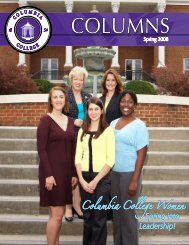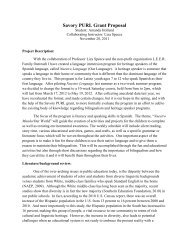Heart andsoul - Columbia College
Heart andsoul - Columbia College
Heart andsoul - Columbia College
Create successful ePaper yourself
Turn your PDF publications into a flip-book with our unique Google optimized e-Paper software.
Cornelia<br />
Rickenbacker<br />
Freeman ’33<br />
Alumnae Spotlight:<br />
An afternoon visit with Cornelia Rickenbacker Freeman<br />
provides a delightful glimpse of a diminutive lady who<br />
modestly acknowledges she has been a champion for<br />
music in South Carolina. Now at age 97, she enjoys<br />
life in a retirement community where<br />
a focal point in her apartment is an<br />
upright piano, the top lined with family<br />
photos. “Oh, these hands really can’t<br />
play anymore,” she says with a smile of<br />
blithe acceptance at the toll of arthritis.<br />
Quickly on to other subjects, Cornelia<br />
is scarcely able to keep her seat as a<br />
fresh anecdote compels her to find a<br />
photograph or an event program in her<br />
well-organized collection of memorabilia.<br />
“I can lay my hands on it, just a<br />
second…” as she rises and dashes into<br />
her study to reappear with a <strong>Columbia</strong><br />
<strong>College</strong> 1933 yearbook.<br />
Cornelia graduated from her rural school<br />
in Cameron as valedictorian of a class of<br />
twelve and decided to follow her mother’s<br />
footsteps to <strong>Columbia</strong> <strong>College</strong>, “I thought<br />
I might study to teach.” Asked if she was<br />
already an accomplished musician when<br />
she entered college she says, “Not really,<br />
I did what you call ‘took’ music,” she laughs, “in other words, I had music<br />
lessons as a girl. My mother went with me to Orangeburg for me to study<br />
piano with a teacher named Angie McMichael.”<br />
“After college, I taught in public school and arranged for<br />
private piano lessons for pupils in the afternoon. When Bob<br />
Freeman and I were married we lived in a house in <strong>Columbia</strong><br />
and had three children before he was drafted for army<br />
service in World War II. While he was away, the children<br />
and I moved to Cameron where we lived in a house near<br />
my parents. When Bob was discharged in 1945, we planned<br />
for a new house to be built for us in <strong>Columbia</strong>, returning as<br />
soon as it was completed. There I was able to continue my<br />
involvement with music in the community.”<br />
in <strong>Columbia</strong> when the national season was over, usually in April.<br />
I volunteered, solicited funds, sold tickets and worked with many<br />
others to help make that happen. It became the Southern Symphony,<br />
which was active until the very end of the war, then it sort of faded<br />
away,” she recalls.<br />
“Another effort was made to organize an orchestra in the 1950s<br />
but it never quite took off. In 1963, there were a lot of musicians<br />
who wanted try again so they got Mr. Harry Jacobs from Augusta<br />
to have a trial concert---<strong>Columbia</strong> <strong>College</strong>’s Guthrie Darr helped<br />
with that, too---and it went extremely well. So we put together a<br />
very successful season for 1964. In 1965 we formed a Women’s<br />
Symphony Association, which later became the Symphony League,<br />
and I was on the board for that. In <strong>Columbia</strong> there were groups like<br />
the Afternoon Music Club which had been active since 1905, the<br />
Eaue Clair Music Club since 1940, and others that all belonged to<br />
the National Federation of Music Clubs and attended the national<br />
conventions. They were all active organizations with purposes,<br />
aims and goals.” Cornelia doesn’t dwell on her leadership and<br />
accomplishments and sums it up this way, “Anyway, one thing after<br />
another happened, and I was elevated to positions on the national<br />
scene with the Federation.” She served one term as president of<br />
the South Carolina Federation of Music Clubs and became a board<br />
member of the National Federation of Music Clubs from 1971 until<br />
1991. She is a life member of both organizations.<br />
Where Are They Now?<br />
Columns Catches Up With Retired Faculty<br />
Dr. Dave Day<br />
D<br />
Her connection with <strong>Columbia</strong> <strong>College</strong> has remained strong through<br />
the Alumnae Association, and she fondly remembers serving as<br />
alumnae chair for the grand opening and dedication of the Spears<br />
Music/Art Center when it was built in 1977. “The <strong>College</strong> was in a<br />
rebuilding phase over the decade following the devastating fire of<br />
1964 and it was an exciting time to be involved.” Over the years, her<br />
love of music and her husband’s business success inspired them<br />
to contribute over $100,000 to <strong>Columbia</strong> <strong>College</strong>. She describes<br />
receiving an honorary doctorate from <strong>Columbia</strong> <strong>College</strong> in 1997 as<br />
one the “greatest surprises of my life.” In fall 2001, one year after<br />
Bob’s death, Cornelia decided to make a special gift in honor of Bob<br />
and her mother, Louisa Salley Rickenbacker, Class of 1895. Louisa<br />
was known for many years as the <strong>College</strong>’s oldest living alumna,<br />
until her death in 1984 at the age of 107. With the encouragement<br />
of her family, Cornelia donated her mother’s family property in<br />
Orangeburg, South Carolina, to the <strong>College</strong>.<br />
Cornelia’s decades of energetic leadership and influence, local and<br />
national, now bring courtesy calls from people such as Morihiko<br />
Nakahara, music director and conductor for the South Carolina<br />
Philharmonic. “Until last year I hadn’t missed a single Philharmonic<br />
performance. I was indisposed…a ‘dizzy day,’” she says with good<br />
humor toward the occasional inconveniences of age.<br />
Contrary to those who may think that <strong>Columbia</strong>’s music<br />
Since retiring from the <strong>College</strong> in 2004 after 19 years gym regularly and enjoys reading, although much of<br />
scene is relatively new, Cornelia holds the view that there<br />
as professor of management in the department of his reading is work related. He and Barbara are avid<br />
has always been a vibrant music community here. As far<br />
business and economics, Dr. Day has been working travelers and have visited Norway, Sweden and<br />
During her first year at <strong>Columbia</strong> <strong>College</strong>, Cornelia auditioned for the<br />
Glee Club. “We toured South Carolina and I have some good stories<br />
about that,” she smiles and shares a favorite. “We wore long dresses<br />
and in one particular town the venue stage had curtains that rolled up.<br />
Fortunately I was not on the front row, because when the curtain rose, it<br />
caught one singer’s dress and rolled it right up, too!” She recalls living her<br />
first year in the East Wing residence hall with another young woman from<br />
Cameron. Later she roomed in West Wing with a younger cousin, “and<br />
she stood up with me for my wedding a few years later.” The only campus<br />
building that remains standing from her college years is the Vera Young<br />
Library, which is now “The Parlor” of Alumnae Hall. Cornelia’s sparkle<br />
and quick smile make it easy to imagine her as a popular young woman<br />
who was active in campus life and elected president of the student body.<br />
She graduated at the top of her class, valedictorian once again, with a<br />
bachelor of arts degree and a certificate in piano.<br />
back as her mother’s time at <strong>Columbia</strong> <strong>College</strong> in the 1890s,<br />
“there were important music performances held at the <strong>College</strong> and uptown.<br />
With the Depression things went<br />
downhill, but there was a lot<br />
going on in music. Even before<br />
I was married in 1935, my future<br />
sister-in-law was a violin player,<br />
and she organized an impressive<br />
orchestra of townspeople---not<br />
just students---who practiced and<br />
performed at <strong>Columbia</strong> <strong>College</strong>.“<br />
During the war, she recalls, many<br />
musicians fled Europe and then<br />
found work in the big orchestras,<br />
like New York and Philadelphia.”<br />
Cornelia and others saw<br />
opportunity in this influx of talent,<br />
“The arts community worked<br />
to draw those musicians here<br />
by organizing a music festival<br />
Cornelia with the table her son made of stairway<br />
as a management coach for corporate clients in<br />
<strong>Columbia</strong> and Florence, focusing mainly on two key<br />
services. One is a ‘360’ evaluation process designed<br />
to help managers identify strengths and weaknesses<br />
that will help them become more effective. The<br />
second is a concept called talent management in<br />
which Day works with small groups of employees<br />
who have been targeted as high potentials, and are<br />
being groomed for future managerial opportunities.<br />
His present work allows him to draw on his own<br />
managerial experience, classroom teaching from<br />
his days at <strong>Columbia</strong> <strong>College</strong>, together with his<br />
counseling degree. Day likens his role to that<br />
of a favorite Biblical figure, Barnabas the great<br />
encourager. As a management coach, Day’s goal<br />
is to serve as an encourager to those interested<br />
in reaching their full potential as managers and<br />
business leaders. When asked about his hobbies,<br />
Day cheerfully says his work remains his primary<br />
hobby. But, he also enjoys singing in the church<br />
choir, to include being part of a male quartet, at<br />
Northeast United Methodist Church where his wife<br />
Barbara is the choir director. He also works out at the<br />
Denmark. They also enjoy visiting New England to see<br />
the fall leaves, have taken an Alaskan cruise and most<br />
recently took a trip to Sedona, Ariz.<br />
“Ole Doc D” is beloved by his former students, who<br />
remember him as an inspiring mentor who brought<br />
out the best in his students. His charisma and ability<br />
to engage and relate to students created a reciprocal<br />
classroom environment. Day says his mantra for<br />
<strong>Columbia</strong> <strong>College</strong> students and alumnae has not<br />
changed, that is, “Even after you graduate, you must<br />
remain a lifelong learner, especially in today’s work<br />
environment.” Alumnae often recall that he made their<br />
classroom experiences energized and relevant with<br />
assignments that were related to the real business<br />
world, with lessons that influenced their career choices<br />
and helped them to recognize their potential as<br />
leaders in the workplace and community.<br />
Dr. Day would enjoy hearing from former students<br />
(his “Troops”) and colleagues. You can e-mail him<br />
at ddavidday@earthlink.net or write to him at 212<br />
Wiltshire Way, <strong>Columbia</strong>, SC 29229.<br />
10 C O l u M B i A C O l l E g E spindles retrieved from Old Main after it burned<br />
in the 70s.<br />
w w w . c o l u m b i a s c . e d u<br />
11<br />
n n n




